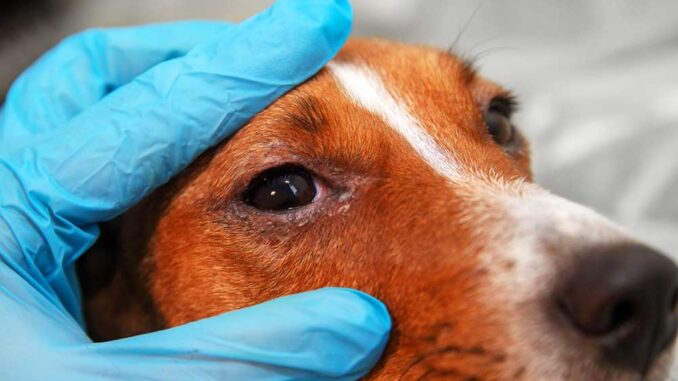
This article was updated on March 5th, 2023
There are few things scarier than your dog having a swollen eye. As a veterinarian, it’s a common reason behind many panicked office visits, and with good reason. Not only do swollen eyes in dogs look bad, they can be very painful as well. Let’s find out what can cause swollen eyes in dogs and what you can do to help him.
What to do if Your Dog Has a Swollen Eye
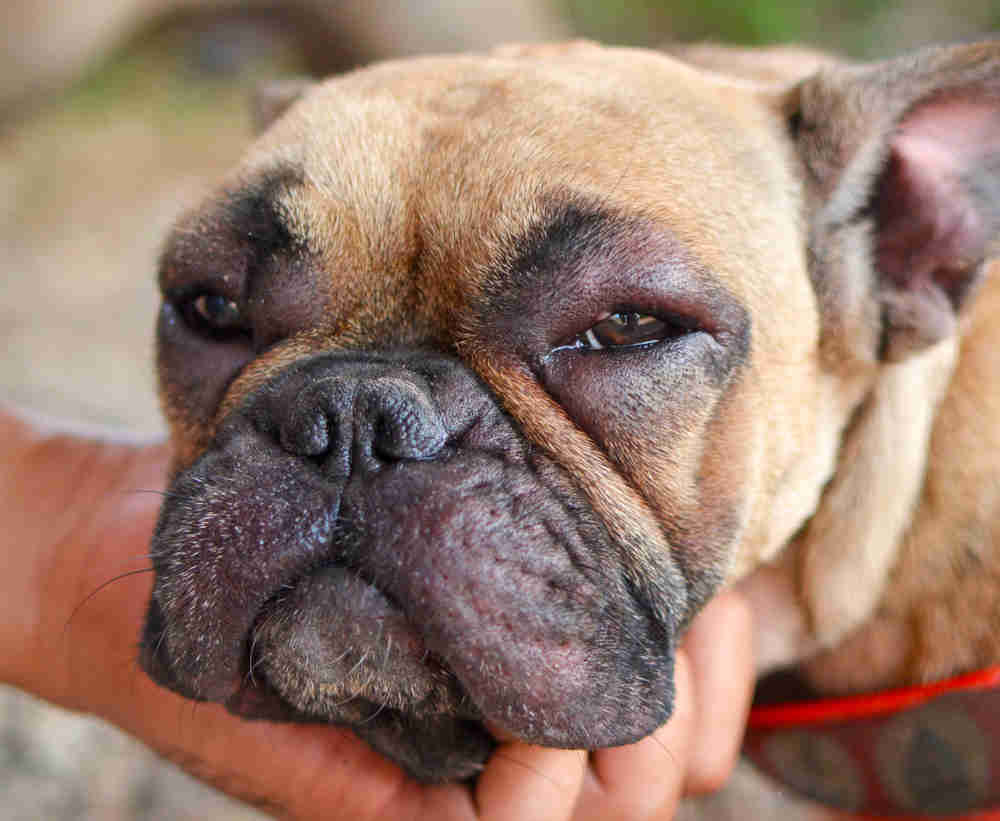
Swollen eyes are nothing to mess around with, so your first step should always be to call your veterinarian to make sure you get a proper diagnosis to ensure the right treatment. But that doesn’t mean there aren’t some at-home treatments that you can try while you’re waiting for your veterinary appointment.
- For mild discharge, redness and swelling, you can try flushing your dog’s eye with a sterile saline solution or dog eye wash such as Vetricyn Plus. This may help remove any irritants, allergens or small, loose foreign objects to provide your dog with some relief.
- If the swollen eye pops up suddenly or if you suspect it came from a bug bite, sting or allergies, give your dog an antihistamine dose based on the recommendations of your veterinarian.
- Apply a warm compress, if your pup will let you, over the swollen area to help decrease the swelling and make them more comfortable. Make sure the compress isn’t too hot by testing on the inside of your wrist first.
- See your veterinarian and follow their recommendations and treatment plan!
When Should You See the Vet for a Swollen Eye in Dogs?
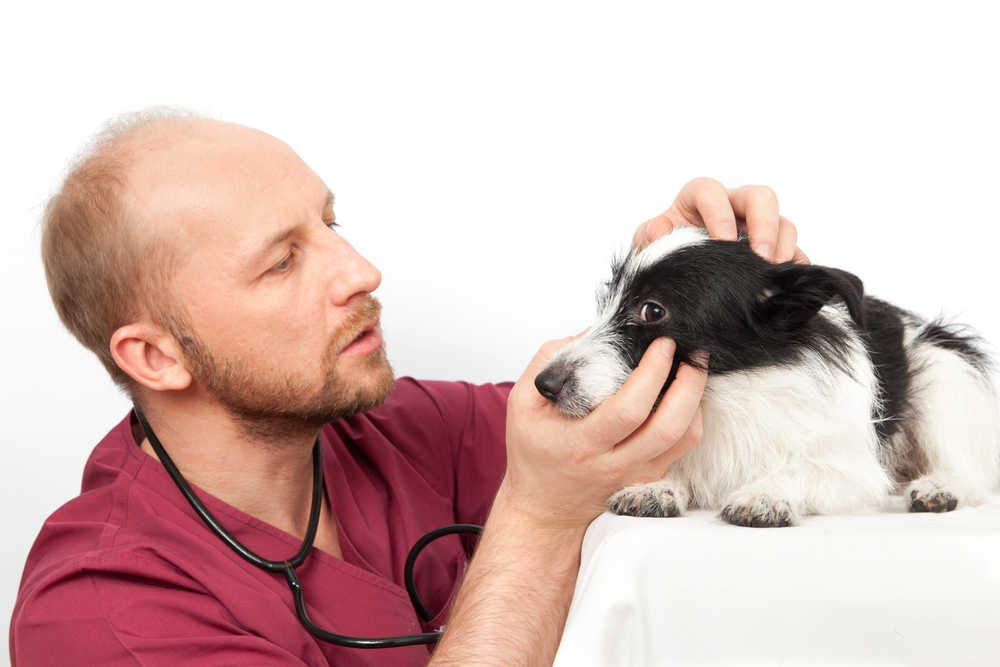
Always error on the side of caution when it comes to swollen eyes in dogs and at least consult your veterinarian before trying any at-home treatments. However, a proper diagnosis can’t be made over the phone, so your vet will more than likely ask you to bring your pup in any time they have a swollen eye.
Don’t hesitate to call your vet if:
- your dog has any swelling in or around the eye, excess discharge, redness, or
- if they are rubbing, squinting, or scratching their eye.
If the signs are mild, you can seek the next available appointment. If the signs are severe or if your dog is in a lot of pain, head to the emergency clinic.
What Causes Swollen Eyes in Dogs?
Lots of things may cause a dog’s eye to swell along with other signs. Please note that a veterinarian should definitively diagnose your dog’s swollen eye as it’s sometimes not possible to diagnose on an image or description alone.
1. Conjunctivitis:
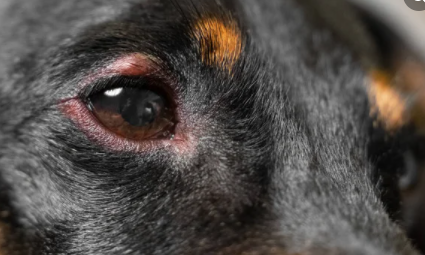
Also known as pink eye, this is when the tissues surrounding the eye become inflamed, swollen and red. You may also notice watery or thick, colored discharge. Your dog may rub or scratch their eye and squint.
Conjunctivitis can be caused by irritation or by an infection. It can happen in one or both eyes and usually responds to medicated eyedrops.
2. Allergies:

Dogs may develop allergies to pollen, mold, grass, chemicals, or smoke. Allergy eyes may cause swelling around the eyeball, redness of the eyeball, and clear, watery discharge. Allergies are usually pretty itchy so your pup my scratch or rub at the swollen eye.
Allergies are most often going to cause swelling to both eyes at the same time. It can be difficult to pinpoint the exact allergen to remove from a dog’s environment, so treatment with antihistamine or anti-inflammatory eyedrops is usually needed.
3. Bug bites or stings:
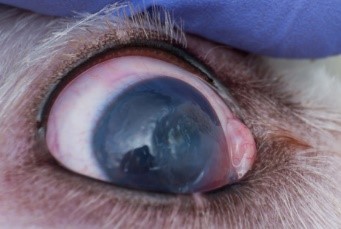
Since dogs like to explore with their faces, it’s not uncommon to get a bug bite or sting near his eye. This will cause sudden swelling around the eye along with redness, heat and pain. There may or may not be discharge from the eye and dogs will most likely be very itchy, rubbing and scratching at the sting.
Immediate treatment with an antihistamine will usually reduce the swelling from an insect bite or sting around the eye. Depending on what did the stinging, further treatment with antibiotics and anti-inflammatories may be needed.
4. Eyelash/eyelid Issues:
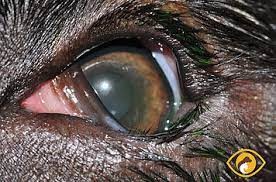
Eyelashes and eyelids don’t always grow as they’re supposed to. When things aren’t located where they should be or don’t meet up properly, it can cause irritation that leads to redness and swelling of the eyelids and tissues around the eye. The eyeball may also be red and have clear or colored discharge.
Treatment will depend on the condition. Some eyelash and eyelid abnormalities may require surgery to correct. Medicated eyedrops and anti-inflammatories may be needed to reduce the swelling.
5. Injuries:
A poke, a swap, a thump on the head, anything like this can cause swelling of the eye and tissues around it. Depending on what the injury is, the eye may be red and watery, swollen shut, and very painful. This is usually going to only affect one eye but may include both if the injury was large enough.
If you don’t know what injured your dog’s eye, have your vet make sure there isn’t other trauma to your dog’s head. Anti-inflammatories, cold compresses, and other medications may be needed to treat injuries to and around the eye.
6. Corneal Ulcers:
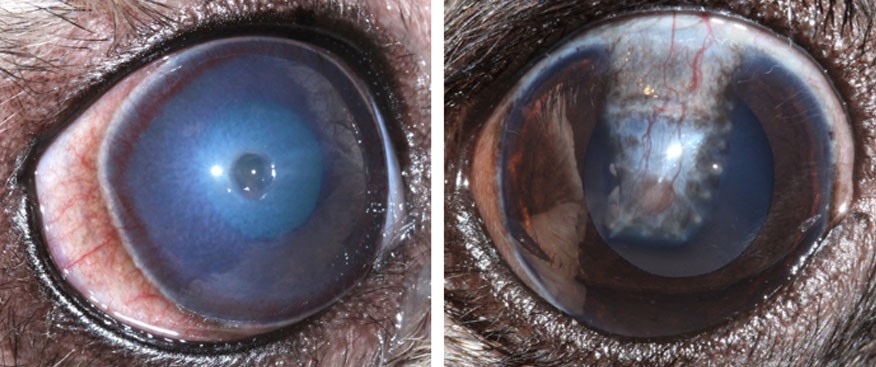
The cornea is the clear part of the eye. It can become scratched by an injury or irritant in the eye. Corneal ulcers cause the eyeball to swell which gives it a bluish color. The eye will turn red as it starts to heal. The tissues around the eye may swell as a dog starts to rub or scratch their eye as well. There will also be lots of clear or colored discharge.
Corneal ulcers need immediate treatment because they can progress to the point a dog loses an eye. Your vet will use medicated eye drops or even surgery to repair corneal ulcers. Corneal ulcers are usually going to affect only one eye.
7. Glaucoma:
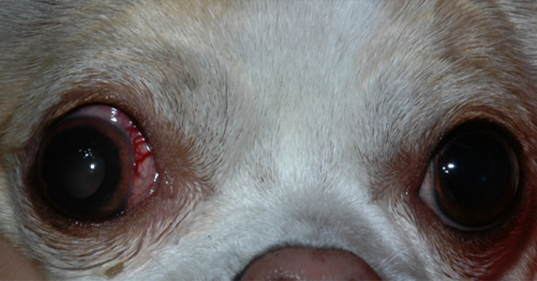
https://www.medvetforpets.com/
This a condition that increases the pressure within the eye due to increased fluid buildup. Glaucoma causes one or both eyes to swell and stick out further from the eye socket. It is very painful and may cause rubbing and redness.
Glaucoma can be tricky to get a handle on. Medicated drops are given to help decrease pressures in the eye to make a dog more comfortable and hopefully preserve eyesight. These drops have to be given for life.
8. Tumors:
Eye tumors can show up on the eyeball, the eyelids, the tissues around the eye, or behind the eye. Wherever they are, tumors can cause swelling and irritation, redness, watery discharge and discomfort. If they’re behind the eye, a tumor can cause the eyeball to stick out from the socket.
Treatment will depend on where the eye tumor is. Some can be removed and some may require the eyeball to be removed. Tumors are usually going to only affect one eye.
Is My Dog’s Eye Swollen?
A swollen eye is any time the tissue surrounding the eye becomes enlarged. Here are common signs that your dog’s eyes are swollen:
- You can see a little puffiness above or below the eyeball.
- Your dog’s eye swells to the point you can’t see the eye anymore.
- You may also notice watery or thick, colored discharge from the eye, redness, or heat.
- Most dogs will squint, paw, or rub at the swollen eye.
- Some dogs may have some sensitivity to light.
Most of the time the swelling of your dog’s eye will be very obvious. Other times you may have to look twice before you notice that his eye is swollen. If that’s the case, take note of any other signs, such as discharge, redness, or pain.
A swollen eye may also be in the eyeball itself. If this is the case, the eyeball may stick out of its bony socket more than usual or the eyelids might not close completely around it. Swollen eyeballs are very painful and may cause a pup to whine or whimper and may have lots of discharge.
What Will a Veterinarian do?
Your vet is going to perform a full exam on your dog and their swollen eye. They may use eye drops to numb or dilate the eye or a special stain to check for scratches or abrasions on the cornea. They will want to know:
- when the swelling started,
- if you know what is causing it, and
- any other signs they may be showing, such as a decreased appetite, lethargy, etc.
How much will it cost?
For infections or allergies, expect your pup to go home with eyedrops. The cost will be around $50-$150. For corneal ulcers, eyedrops will treat most cases, however more severe ones may require surgery. Look to pay $100-$500 here. For glaucoma or uveitis, treatment may require referral to a veterinary ophthalmologist and so you may end up paying $300-$3,000. Tumors or abnormalities that require surgery may also require referral to a specialist so the cost may end up the same as glaucoma.
Swollen Eyes or Eye Infections?
While eye infections of various causes are commonly the reason that a dog has a swollen eye, they’re not the only reasons. Your veterinarian may have to differentiate a swollen eye from an infection in order to properly treat the issue. However, the telltale sign of an eye infection is usually thickened discharge. Irritation, allergies and injuries typically cause the eye to produce lots of watery tears, while an infection may bring on thick, colored discharge. Learn more: Pictures of eye infections (with veterinarian explanations).
In some cases, an eye infection may happen after a swollen eye. This is because bacteria like to move in secondarily to things like injuries or bug bites, and so what started out as a simple swollen eye gets complicated by an infection later on.
FAQ
When should I be concerned about my dog’s swollen eye?
Pretty much any swelling in or around the eye is a cause for concern. The only exception would be if you know he got a mild bump on the head that caused mild swelling and everything else is ok. All other causes of swollen eyes in dogs should be seen by a veterinarian.
Are there breeds more likely to develop swollen eyes?
Generally speaking, dogs that have protruding eyeballs are more likely to get injuries causing swollen eyes. Those are Shih Tzus, Pugs, Chihuahuas, Boston Terriers, and Bulldogs. Also, dogs that have a lot of hair around his eyes may also be prone to swollen eye issues. These include Poodles, Golden Retrievers, Sher-peis, and Chow Chows.
Is my dog’s swollen eye affecting his vision?
Whether or not your dog’s swollen eye is affecting their vision will depend on the cause and severity of the swelling. If the eye is swollen shut or near shut, your dog won’t be able to see as well. If the swelling is in the cornea or eyeball itself, his vision is going to be diminished. If the swelling is just in the tissues around the eye, excessive watering may blur their vision but it will otherwise be normal.
Related posts about dog eye issues:
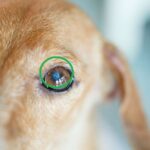
Disclaimer: This website's content is not a substitute for veterinary care. Always consult with your veterinarian for healthcare decisions. Read More.


Be the first to comment